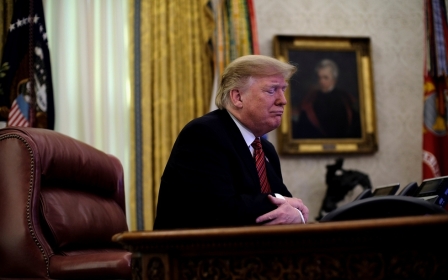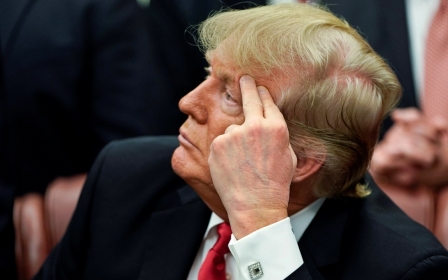Elizabeth Warren 2020: Where does progressive senator stand on Palestine?
WASHINGTON - US Senator Elizabeth Warren, known for her daring political stance on economic inequality and willingness to challenge "corporate greed," is now running for president, hoping to receive the Democratic nomination for the 2020 election by virtue of her advocacy of progressive causes.
Yet despite her bold positions, the Massachusetts senator has been criticised for her hawkish support for Israel, which activists say embodies the standard bias in Washington on the Middle East conflict.
Still, that may be changing as part of a wider move within the Democratic Party caused in large part by what analysts say has been the adoption of the Palestinian cause by the party's left-wing base.
In line with that shift, Warren recently came out against a proposal to criminalise boycotting Israel and was critical of Israel's use of deadly force against Gaza protesters in 2018.
But taking that type of position wasn't always standard practice for Warren.
Gaza war
"As a United States Senator, I will work to ensure Israel’s security and success, and I will support active American leadership to help bring peace and security to Israel and the region," her 2012 Senate platform said.
During the 2014 Israeli war on Gaza, which led to the death of more than 2,200 Palestinians, most of them civilians, Warren defended a senate vote for additional military funding for Israel.
"America has a very special relationship with Israel," Warren said at the time, after being confronted about the issue by a supporter, as reported by the Cape Cod Times.
"Israel lives in a very dangerous part of the world, and a part of the world where there aren’t many liberal democracies and democracies that are controlled by the rule of law. And we very much need an ally in that part of the world."
Palestine is becoming more and more a progressive tenet, and the older leadership of the party is losing ground with the younger generation around it
- Muhammad Sankari, USPCN
She went on to blame Hamas when Palestinian civilians were killed in Israeli bombings.
"When Hamas puts its rocket-launchers next to hospitals, next to schools, they’re using their civilian population to protect their military assets. And I believe Israel has a right, at that point, to defend itself," she said.
After the war, she made her first foreign trip as senator to Israel and the Palestinian territories.
Warren was also one of 80 co-sponsors of the United States-Israel Strategic Partnership Act of 2014, which solidified Washington's aid and security commitment to Israel.
Old centrists, young leftists
Recent public opinion polls have also signalled a growing rift between the historical US position of favouring Israel and the views of young progressive voters, who will be a key constituency when the Democratic presidential hopefuls start the race for the nomination in Iowa early in 2020.
Palestine is re-emerging into the "mainstream progressive discourse" in the US, said Muhammad Sankari, an activist with the US Palestinian Community Network (USPCN).
Sankari said the "tireless work" of activists and solidarity groups, including support from the Black Lives Matter movement, has made Palestine a "defining factor" in what makes one a progressive.
But there remains a schism between the "more conservative elites" of the Democratic Party and the younger progressive base, he told Middle East Eye.
"Palestine is becoming more and more a progressive tenet, and the older leadership of the party is losing ground with the younger generation around it."
A Pew poll from early 2018 showed that only 27 percent of Democrats sympathise with Israel more than they do with Palestinians, compared to 79 percent of Republicans.
A survey released by the University of Maryland late in the year revealed growing support among Democrats for a single democratic state in Israel and the Palestinian territories, even if Israel would no longer be a "politically Jewish state".
According to the survey, 78 percent of Democrats said they would back a single state with equal rights if the two-state solution were not possible.
When Hamas puts its rocket-launchers next to hospitals, next to schools, they’re using their civilian population to protect their military assets. And I believe Israel has a right, at that point, to defend itself
- Elizabeth Warren in 2014
As potential Democratic voters increasingly question the US position in the Middle East, Warren has strayed even further from her once fierce advocacy of Israel.
The Massachusetts senator criticised Trump's decision to move the US embassy to Jerusalem, saying it makes achieving the two-state solution "more difficult".
"Jerusalem is the capital of Israel," she said at a Union for Reform Judaism conference in late 2017. "And diplomacy between Israelis and Palestinians should determine the status of Jerusalem for all parties."
That same year, Warren joined nine of her Democratic colleagues in signing a letter urging Israeli Prime Minister Benjamin Netanyahu to ditch plans to demolish the West Bank Palestinian villages of Khan al-Ahmar and Susiya.
"We have long championed a two-state solution as a just resolution to the Israeli-Palestinian conflict," the senators wrote.
"Yet, your government’s efforts to forcibly evict entire Palestinian communities and expand settlements throughout the West Bank not only directly imperil a two-state solution, but we believe also endanger Israel’s future as a Jewish democracy."
Recent positions
Tamara Kharroub, senior Middle East fellow at the Arab Center Washington DC, said the "blatantly unconstitutional" anti-boycott bill was a "turning point" for Warren and other Democrats.
The American Civil Liberties Union has called the measure, which was introduced in 2017, a threat to free speech rights. The bill has not passed but is still up for consideration. It initially called for criminal prosecution against both companies and individuals that boycott Israel, but after an outcry by free speech advocates, it was amended to only impose fines on US businesses that participate in Israel boycott.
In April, Warren appeared to make her harshest criticism of Israel on record, after Israeli forces shot dozens of Palestinian protesters in the Gaza Strip.
"I am deeply concerned about the deaths and injuries in Gaza," she said in a statement to the Intercept. "As additional protests are planned for the coming days, the Israel Defense Forces should exercise restraint and respect the rights of Palestinians to peacefully protest."
A month later, she joined her fellow progressive senator and likely 2020 Democratic primary opponent Bernie Sanders, who led a dozen lawmakers in demanding that Washington address the humanitarian conditions in Gaza.
"The territory’s lack of power, clean water, adequate medical care and other necessities not only exacerbates the hardships faced by Gaza’s population, but redounds to the benefit of extremist groups who use this deprivation and despair to incite violence against Israel," the senators wrote in a letter to Secretary of State Mike Pompeo.
The statement also called for restoring American assistance for the UN agency for Palestinian refugees (UNRWA), which had been cut by President Donald Trump.
Despite these recent examples, Kharroub of the Arab Center said while the Democratic Party is changing, it remains controversial for US politicians to denounce Israeli policies against Palestinians.
Doing so carries a political risk, including possible accusations of anti-Semitism, she said, and many Democrats will be approaching the Israeli-Palestinian conflict with caution ahead of 2020.
"If one issue was going to affect their career, many of them would choose to drop it or to go with the conventional mainstream narrative," she said.
New MEE newsletter: Jerusalem Dispatch
Sign up to get the latest insights and analysis on Israel-Palestine, alongside Turkey Unpacked and other MEE newsletters
Middle East Eye delivers independent and unrivalled coverage and analysis of the Middle East, North Africa and beyond. To learn more about republishing this content and the associated fees, please fill out this form. More about MEE can be found here.




